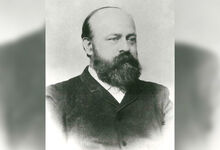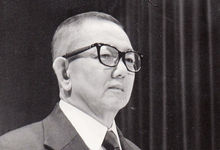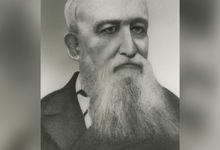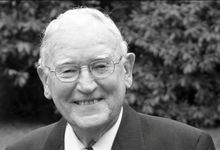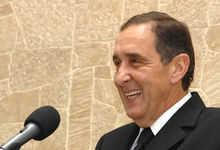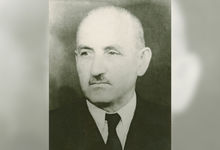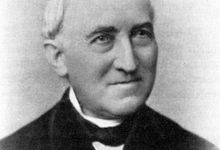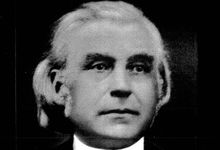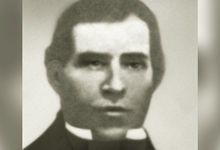The ascent and exit of Ernst Güttinger
It was 70 years ago, on 5 August 1951, that the then Chief Apostle Johann Gottfried Bischoff retired him. Today, Ernst Güttinger would have been 144 years of age. Who was this man who left behind such a mixed legacy?
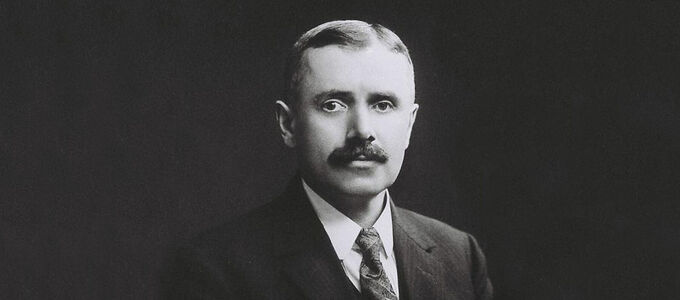
Dübendorf is a small village a little outside of Zurich in Switzerland. It was there that Ernst Güttinger first saw the light of day on 19 August 1877. Such references to a person’s birthplace can at times play a role in his biography. After he was ordained an Apostle, Ernst Güttinger wrote as follows about his childhood years in his curriculum vitae: “My parents were simple, hardworking, and God-fearing. They raised us children accordingly.“ His mother died when he was 12 years old. “My living conditions were drastically changed as a result, and even before my confirmation I had to stand on my own two feet.”
One of the first Swiss citizens to become New Apostolic
The first New Apostolic divine service he ever attended was conducted by Chief Apostle Friedrich Krebs—and that was in 1895. As an 18-year-old, he was one of the first Swiss citizens to receive the sacrament of Holy Sealing. This was on 3 May 1896, and in the fall of that same year, he was ordained to the Sub-deacon ministry by Apostle Sebastian. “In the spring of the year 1900, the later Apostle Bock sent me to Schaffhausen to establish a congregation there. This was a great task. I did not think myself capable of such a thing, but in trust and obedience of faith, I fulfilled this mission. Ministers from Zurich supported my endeavours, and so the congregation began to grow rather quickly with God’s rich blessing.” Güttinger became the congregation’s first rector.
Apostle ministry – District Apostle ministry
In 1923 the then Chief Apostle Niehaus ordained him as an Apostle. After the Swiss District Apostle August Hölzel died in 1933, Chief Apostle Johann Gottfried Bischoff conferred responsibility for the Apostle district of Switzerland to Apostle Ernst Güttinger on 14 February 1933. The congregations in France, Luxembourg, and Austria were also part of this working area for a long time. His contemporaries described him as a wise, objective, and level-headed person. But eighteen years later, there was quite an upheaval.
Disagreements
Against his will, Chief Apostle Bischoff retired the 74-year-old District Apostle Ernst Güttinger on 5 August 1951, together with the Apostle Rudolf Schneider senior. Both of them had exceeded the age limit that had in the meantime been established for Apostles. This limit had only been set—at the age of 70—by an Apostle Meeting in March 1951. Apparently Chief Apostle Bischoff later had to justify himself at a ministers’ meeting in Zurich for having retired the Apostles at the end of their normal working tenure—at least that is what the records tell us. The irony about it all was that Ernst Güttinger had for years himself advocated in favour of limits on the term of office of the Chief Apostle and the Apostles.
Bischof Ernst Eschmann became his successor. In several letters to the Chief Apostle, Ernst Güttinger spoke out against this choice of successor, and instead proposed his son, Otto. And it was only after District Apostle Eschmann died just a year and a half later and Ernst Streckeisen was ordained as the new District Apostle, that these divisions came to light.
And these divisions manifested themselves in several ways all at once, namely in the form of disputes over doctrinal interpretations, as well as disagreements over personnel changes in what was then the district of Saarland. The Church in Saarland had for some time been showing tendencies in the direction of independence. To counter this, Chief Apostle Bischoff entrusted the Apostles from Switzerland with the leadership of the Apostle district of the Saarland. This gradually led to great unrest. As a result, the Swiss Apostles were recalled from the Saarland, and some 4,000 members were excommunicated from the Saarland congregations. The new French Apostle Chrétien Dauber then assumed leadership in the Saarland.
Dismissal from ministry, excommunication, estrangement
In June 1954 the Swiss Apostle Otto Güttinger was dismissed from his ministry and excommunicated from the New Apostolic Church—and his father followed him. Together they established the Association of Apostolic Christians in Switzerland (United Apostolic Church) with an initial membership of approximately 1,000. In September 1954, they joined forces with the Church members from Saarland who had been excommunicated, and assumed leadership of the new organisation as its highest ranking clergy.
What had once belonged together thus drifted apart—in many places over heated dispute.
Reconciliation after 50 years
It required great courage and persistence to fill in these decades-old trenches, but it was worth the effort: in April 2005 the New Apostolic Church Switzerland and the United Apostolic Church Switzerland signed a joint declaration of reconciliation. This document expresses regret over the considerable controversies of the time, and acknowledges that these divisions brought “deep heartache, great sorrow, and material harm to many families and congregations”. As a gesture of reconciliation, the leadership of the New Apostolic Church Switzerland apologised to those affected “for the improper decisions made at that time and for the unchristian behaviour demonstrated in some places by the unwarranted actions and reactions of some of its members”. In addition, the “Church bans and excommunications that had been imposed in this context” were repealed “with immediate effect”.
The leadership of the United Apostolic Church Switzerland likewise apologised “for the improper reactions that some of its members had in the context of the disputes of the time”. The joint declaration ends with the statement: “In the words of Apostle Paul, we implore all our brethren very warmly: ‘Be reconciled to God!’ (2 Corinthians 5: 20).”
Photo: NAK Westdeutschland Zentralarchiv
Article info
Author:
Date:
Keywords:
Peter Johanning
05.08.2021
Europe,
Apostle,
District Apostle,
People/Personalities,
retirements


